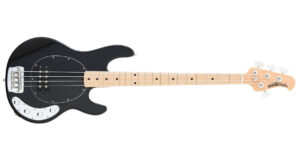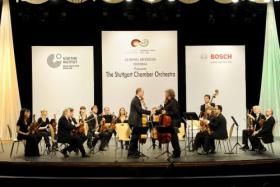 Western classical music is remarkably forgiving of one’s musical inadequacies. Read on to see how Stuttgart Chamber Orchestra created an epiphany for our newest correspondent.
Western classical music is remarkably forgiving of one’s musical inadequacies. Read on to see how Stuttgart Chamber Orchestra created an epiphany for our newest correspondent.
The plaintive wail of a violin, or the mournful undertone of a cello speak to something more visceral than the intellectual enjoyment of philosophical lyrics or the appreciation of ground-breaking new ways of making sounds.This, to me, is the pull of Western classical music over anything else.
Chennai has seen a number of classical music events in the last few years, with the two best ones being the Deutsch Philharmonie Merck’s magnificent performance in September this year and, for the very first time, a performance of opera arias by the Swedish tenor Mats Carlsson in October last year. For a city that’s commonly considered to be more appreciative of alankarams than allegros, Western classical music has had a dedicated audience.
My own interest in classical music comes from an Anglophile grandmother; my visits to her house were always played out against a background of Beethoven, Bach, Mozart, Bizet, Liszt, Tchaikovsky and Brahms.
It was this grandmother who took me along to The Stuttgart Chamber Orchestra’s performance on a lazy Sunday evening in Chennai. The performance began slightly late, but their charming director, Max Wagner, soothed any ruffled feathers by giving the audience just the right amount of background on the pieces being played, and (having been forewarned, no doubt, of the audience’s propensity to clap eagerly between movements) advised us to withhold our applause right till the end.

With these preliminaries out of the way, the orchestra – violins, violas, cellos and a double-bass – came on stage to encouraging applause.
The pieces played before the interval were from the repertoire of three Baroque composers: Arcangelo Corelli, Antonio Lucio Vivaldi (of the ‘Four Seasons’ fame) and my own favourite composer, Johann Sebastian Bach. I’d never heard Corelli before, but I didn’t think he was a rousing way to start the evening – the Christmas Concerto was a bit too mellow and lacked the kind of energy I felt we needed. The crowd seemed to agree with me. But when the first notes of Vivaldi began to be played, it was a sudden, magical awakening around me. Fingers played imaginary strings in the air, feet began to tap in time, and the music of two cellos began to fill the room.

The two cellists made a lovely contrast: one, a clean-shaven, sharply dressed, bald younger man and the other a gloriously full-bearded, elderly gentleman, in whose veins music seemed to flow instead of blood. The musicians were lost in the ecstasy of the music they played and so were we. I’ve always thought of a cello as a particularly mournful instrument, but Vivaldi’s Concerto for Two Cellos and Strings in G-Minor proved me wrong a thousand times over. Bach’s Concerto for Three Violins nicely finished off the first part of the night, with three lively violinists on stage competing for the audience’s attention.

After the interval, it was time to turn to the real business of classical music. The orchestra’s manager helpfully explained to the uninitiated that the Baroque was a distinct musical period from the Classical (think Mozart, Haydn and Beethoven), which was followed by the Romantic, represented that night with a suite by Edvard Greig. The Mozart piece played is one of the best-known pieces of classical music in the world, Eine kleine nachtmusik (I’ve heard it everywhere, including on Tom and Jerry). It’s just the sort of tune you’d want to whistle along to, but the audience settled for bobbing their heads gracefully in time to the violins as they sang.

As Edvard Grieg’s turn came, even the most untrained ear among those seated (I count myself as possessing such a pair) there could tell how the notes, the sounds and the rhythms from the instruments on stage were now subtly different from those heard earlier. Romantic music, I found, is more sweeping, more redolent of rolling hills and brilliant sunrises than the lushness of the Baroque (which makes me think of wainscoted ceilings, of all things) or the technical precision and delicacy of the Mozart piece.
Of the five movements, of the Grieg suite, the Gavotte was my favourite. A gavotte was a French folk dance, which then made its refined appearance in the 18th century French court. The rich notes of the strings, accompanied by the double-bass beating time, were enough to make you picture, if you happened to close your eyes, richly dressed comtes and marquises leading their ladies around a well-appointed ballroom (yes, I got carried away).

The orchestra, headed by concert master Wolfgang Kussmaul, received a standing ovation as they lifted their bows in the air triumphantly at the end of the Rigaudon. For an encore, they played a piece that sounded much more modern than anything else they’d played that night – it had a faintly jazzy air to it, making me think at once of a night in Paris, with the autumn chill and cigarette smoke in the air (and perhaps a cat or two, skulking in the alleyways). The music had that peculiar quality that lonely walks late at night on old streets lit sporadically by yellow lamplight have, a sort of half-lonely, half-comfortable solitude.
This though, is precisely what I like best about classical music. I’ve often said to a friend of mine that I wish there was a way to speak in music: in the way that one says ‘I’m happy’ or ‘sad’ or ‘bored out of my mind’, I’d like to say I’m ‘Beethoven’s 7th Symphony’.
Because for that moment in time, that piece of music is me and I am it. Without the cumbersome presence of words, Classical Music tells you stories and makes you feel in a way that cuts straight to the soul of things. And the best part, I think, is that the story can be anything you like, a different tale every time.
From Brahms to Florence & The Machine with some Glee, for guilty pleasure – quoting Ashwitha Jayakumar on her musical inclinations. When not romanticizing classical music, it’s literature that has her sway. Sigh, she makes the rest of us at Score feel like illiterati!
PHOTO CREDITS: Reiner Pfisterer
You can check out more of his wonderful work here!
Special thanks: Aamir Sayed and Sneha Sahani @ Avian Media








